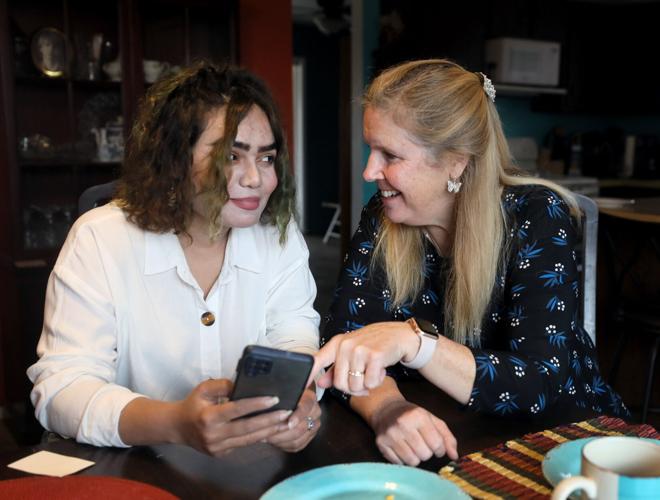Fayaz Ahmadi and his family are a world away from their war-torn native Kabul, the capital of Afghanistan.
The family of six arrived in Tucson in November and feel secure, but still get nervous and have flashbacks of the violence and the Taliban in their homeland.
They escaped days after the Taliban’s swift takeover last summer after the withdrawal of U.S. troops began to end a 20-year war. President Joe Biden said it was time for American military to leave.
Fayaz Ahmadi, 20; his mother, Shakiba Hamidi, 44; sister, Freshta Ahmadi, 23; and brothers, Farzad Ahmadi, Fahim Ahmadi and Qasim Ahmadi, ages 17, 12 and 8, respectively, were among thousands who left their homes fleeing to the Kabul airport. They were among the lucky ones with their documents in order and a pass to make it through a security checkpoint and onto the airport grounds.
Freshta, an artist and journalist for a daily newspaper in Kabul, reported on the Taliban takeover and videoed the violence. She was warned to stop or she would be killed, said her brother Fayaz who speaks English. Their father was killed in Kabul in a bomb blast while walking to work five years ago.
The family lived through fear and violence, things they are working to forget.
In the latest episode that caused the family to make its way to the airport to escape, Fayaz said, “the Taliban was attacking neighborhoods. They killed people who worked with the U.S. Army,” he said. The family ran from their home at night with their documents and only the clothes they were wearing.
“When we reached the outside of the airport, we were under threats from the Taliban. They were armed and told everyone to sit down and not move. They fired their weapons. A lot of people were rushing to the airport and those without documents could not go inside the airport. It was scary. My mom, sister and little brothers were crying,” Fayaz said. “Once inside the international airport, we cried more because we were happy and safe.”
The flight from Kabul to Qatar was packed — making it difficult to breathe — said Fayaz. “We were in Qatar for 20 days and then we flew to Germany and finally arrived in Philadelphia. We were so tired, and rested for one day before flying to a base in New Jersey and then to a base in Indiana, Camp Atterbury, where we stayed for two months,” he said. The base was a training station for Indiana National Guard, but then transitioned into temporary housing for Afghan refugees. The family received vaccinations, including COVID-19, at the base.
On a flight from Atlanta to Tucson — the last leg of their journey to their new home — Fayaz met Tucsonan Stephanie McAndrews, a former elementary teacher and university literacy professor. He shared his family’s story and McAndrews, 57, offered her friendship. McAndrews opened her home on the northeast side for the holidays to the family. They shared meals and festivities, including Hamidi cooking, an Afghanistan meal of dumplings with ground beef, vegetables and a cabbage salad.
McAndrews provided transportation to Tucson Unified district schools for the younger boys until they learned the school bus routine. She routinely picks up the family from a local hotel and takes them on picnics, to Reid Park Zoo and the Tucson Botanical Gardens.
She bought art supplies for Freshta who finds calm, comfort and peace in art. Freshta, whose artistic name is Neksa, studied art for several years at an education center in Kabul. She paints with oils and acrylics and describes her works as modern art. In 2019, she had pieces exhibited in an expo in Dubai, and she plans to paint again and hopes for a future exhibit. She frequently visits McAndrews and enjoys the space and quiet.

"The Modern Painting," an oil painting by Freshta Neksa. Freshta was an artist and journalist in Kabul, Afghanistan, before having to flee with her family.
Both Freshta and her mother, who speak Dari, will enroll in English classes and later look for jobs. The family eventually wants to rent their own house.
Fayaz is a high school graduate and was hired as a senior recreational worker for Tucson Parks and Recreation, earning $12 an hour and working 25 hours a week. He also has a driver’s permit and McAndrews said she will teach him to drive. He plans on studying and improving his English, and then wants to enroll at Pima Community College to study nursing. He also longs for the day he can join a soccer team and show his skills as a forward and midfielder. “These are my dreams for the future. I really like soccer and so do my brothers,” he said.
“We all want to work hard and see what life brings. We sleep better at night and feel safe,” Fayaz explained.
“These are appreciative, kind and grateful people who will contribute to our society and help people see that they want positive things for their families, schooling and education,” said McAndrews. “We need to be reminded that unless our families were native to this land, most of our ancestors came to the United States for a better life. We should not close our doors to others, but open our arms to welcome diverse people as they enrich our lives.”
The International Rescue Committee in Tucson is the refugee resettlement program that is aiding Hamidi and her children. They are among a total of 288 Afghans the agency is helping in Tucson, and it is expecting to help a total of nearly 400, said Aaron Rippenkroeger, executive director for IRC in Arizona.
Lutheran Social Services of the Southwest is a second main agency that is aiding in the resettlement of Afghanistan refugees in Tucson. The agency has provided services to 95 Afghans, and can help at total of 150.
IRC has received nearly $300,000 from the federal government for direct assistance for the Afghans, including shelter, food and other necessities, said Rippenkroeger.
“This is a global humanitarian effort starting in Kabul to cities all over different countries. Roughly 100,000 refugees are out of Afghanistan and most are coming to the United States. We are feeling a certain level of strain because it is a unique humanitarian effort,” said Rippenkroeger, adding that because of the numbers and pace of refugees arriving with short notice they are initially being housed in hotels, and that is happening across the nation since there is a housing shortage.
“In a normal year, refugees do go directly into apartments and housing arrangements have been made,” he said. In Tucson, this latest wave of refugees may be staying in hotels for several weeks and some may stay possibly a month or more, depending on the size of the family. “Families of six and over are harder to place. We are trying to make it as comfortable as we can and have more activities for families at the sites,” said Rippenkroeger. He said staff is working with landlords in the private sector, managers at apartment complexes and management companies to find housing, and families are moving out of hotels every week.
Rippenkroeger said having community members like McAndrews mentor a refugee family “is such a wonderful contribution to helping people coming from a war-torn country feel welcomed and supported.”
“The Tucson community has come together to form this circle of generosity and love and protection for our Afghan arrivals,” said Melanie Reyes, an IRC spokeswoman. “It has been very beautiful.”






